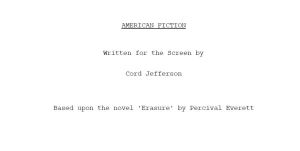Deadline’s Read the Screenplay series spotlighting the year’s most talked-about scripts continues with writer-director Cord Jefferson‘s feature film debut American Fiction.
Adapted from Percival Everett’s 2021 novel Erasure, American Fiction emerges as a hard-hitting commentary on identity, storytelling and the microaggressive terrains of the publishing industry. With a powerhouse ensemble led by Jeffrey Wright and supported by Tracee Ellis Ross, Erika Alexander, John Ortiz, Leslie Uggams and Adam Brody along with Sterling K. Brown and Issa Rae, the film aims to deconstruct that world as it relates to myriad facets of Black lives.
It centers on Thelonious “Monk” Ellison (Wright), a frustrated novelist who’s fed up with the establishment profiting from “Black” entertainment that relies on tired and offensive tropes. To prove his point, he uses a pen name to write an outlandish “Black” book of his own, a book that propels him to the heart of hypocrisy and the madness he claims to disdain.
The most impactful part of the script is about maintaining personal agency in a world that often seeks to define the stories of others. The media’s view of Black lives might never shift, but individuals have the power to set their own narratives and boundaries. This film challenges viewers to reflect, question and possibly reevaluate their perceptions on Blackness in America.
The film had its world premiere at September’s Toronto Film Festival, where it won the fest’s People’s Choice Award that often acts as an Oscar-nom bellwether. MGM released it in select theaters in December, where it has grossed $1.8 million to date.
It has since scored adapted screenplay nominations from the Critics Choice Awards and Spirit Awards. It also has Best Picture noms from those groups as well as the Golden Globes.
As for the origin of the script, Jefferson, an Emmy winner for his work on HBO’s Watchmen, told Deadline that he read a review about a book that was referred to as a satire of Everett’s Erasure. He never read the book that was reviewed, but instead tracked down Erasure and “fell in love with it instantly.”
“Pretty soon into reading it, I knew that I wanted to write the screenplay,” Jefferson said, noting his idea early on was to “make a satire that didn’t ever become farcical” (he also fought for a time for his screenplay’s original title, F*ck, before being talked out of it). “A little after that, I knew that I wanted to write and direct it. And then, at some point, I don’t remember when, I started reading the novel in Jeffrey Wright’s voice. That’s how early I started thinking of Jeffrey for the character of Monk and I started picturing him in the scenes in the novel. The vision for it started taking shape pretty quickly.”
Click below to read his script.

